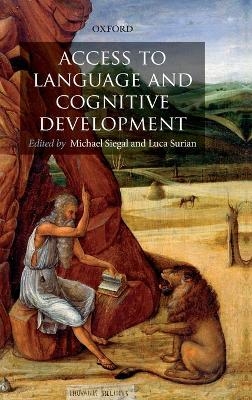
Access to Language and Cognitive Development
Oxford University Press (Verlag)
978-0-19-959272-2 (ISBN)
One of the most important questions about children's development involves how knowledge acquisition depends on the effect of language experience. To what extent, and in what ways, is a child's cognitive development influenced by their early experience of, and access to, language? Likewise, what are the effects on development of impaired access to language?
This book is the first to confront directly the issue of how possessing an enhanced or impaired access to language influences children's development. Its focus is on learning environments, theory of mind understanding and the process of deriving meaning from conversations. The book features state of the art chapters written by leading scholars - psychologists, linguists and educators - who are concerned with bilingualism, deafness, atypical child development, and development in cultures with limited vocabularies in areas such as number concepts. Throughout, it maps out what is known about the interface between language and cognitive development and the prospects for the future directions in research and applied settings
'Access to Language and Cognitive Development' will be of considerable interest to all those who are concerned with the development and welfare of children. It will be of particular interest to researchers and professionals interested in the effects of bilingualism and deafness on young children and in advances in assessment of atypically developing children - for example, those with autism or cerebral palsy who have an impaired access to participation in conversation.
Michael Siegal is a Professor in the Department of Psychology at the University of Sheffield, UK. Professor Siegal has a long history of involvement in research on the development of language and reasoning in typically and atypically developing children, particularly deaf children and children with autism. His work extends to studies of scientific and mathematical understanding in adults following brain damage. Among his books are Knowing Children: Experiments in Conversation and Cognition (second edition, Psychology Press, 1997), Children's Understanding of Biology and Health (co-edited with C. C. Peterson, Cambridge University Press, 1999), The Cognitive Basis of Science (co-edited with P. Carruthers and S. Stich, Cambridge University Press, 2002), and Marvelous Minds: The Discovery of What Children Know (Oxford University Press, 2008). He is a Fellow of the Association for Psychological Science and the Academia Europaea. Luca Surian is a Professor of Developmental Psychology at the University of Trento, Italy. Previously, he held appointments at the MRC Cognitive Development Unit in London (UK) and at the Departments of Psychology of the Universities of Padua (Italy), Trieste (Italy) and North Carolina, Greensboro, where he was supported by a Fulbright Scholarship. For many years, Professor Surian has been carrying out research on the development of language and cognitive processes, with a particular interest in the conceptual development and the acquisition of communicative competence both in typically developing children and in atypically developing children, such as those with autism and specific language impairment. His recent research concerns the development of cognitive processes in preverbal infants, monolingual and bilingual children and deaf children who either have deaf parents or hearing parents. Professor Surian's research is represented in more than 80 scientific publications.
THEORY OF MIND ; 1. How conversational input shapes theory of mind development in infancy and early childhood ; 2. Social relationships and children's understanding of mind: Attachment, internal states and mind-mindedness ; 3. How access to language affects theory of mind in deaf children ; 4. Theory of mind in children with cerebral palsy: The impact of limited expressive linguistic abilities ; ACQUISITION OF PRAGMATICS ; 5. Children's responses to yes-no questions ; 6. Getting information from others: Who do children turn to? ; 7. The scope and origins of children's assumptions of conventionality ; 8. Access to language, social cognition and lexical development in autism ; MULTIPLE ACCESS TO LANGUAGE ; 9. Counting words and a principles-after account of the development of number concepts ; 10. Access to childhood language memory: Implications for cognitive development ; 11. Early bilingualism and theory of mind: Bilinguals' advantage in dealing with conflicting mental representations ; 12. Exploring the effects of bilingualism on children's conversational understanding and moral sense
| Erscheint lt. Verlag | 15.12.2011 |
|---|---|
| Verlagsort | Oxford |
| Sprache | englisch |
| Maße | 164 x 241 mm |
| Gewicht | 560 g |
| Themenwelt | Geisteswissenschaften ► Psychologie ► Allgemeine Psychologie |
| Geisteswissenschaften ► Psychologie ► Entwicklungspsychologie | |
| Geisteswissenschaften ► Psychologie ► Verhaltenstherapie | |
| Geisteswissenschaften ► Sprach- / Literaturwissenschaft ► Sprachwissenschaft | |
| Naturwissenschaften ► Biologie ► Zoologie | |
| ISBN-10 | 0-19-959272-1 / 0199592721 |
| ISBN-13 | 978-0-19-959272-2 / 9780199592722 |
| Zustand | Neuware |
| Informationen gemäß Produktsicherheitsverordnung (GPSR) | |
| Haben Sie eine Frage zum Produkt? |
aus dem Bereich


